Short Book Reviews
Hanna Kryszewska, Poland
Hanna Kryszewska is a teacher, teacher trainer, trainer of trainers. She is a senior lecturer at the University of Gdańsk, Poland. She is co-author of resource books: Learner Based Teaching, OUP, Towards Teaching, Heinemann, The Standby Book, CUP, Language Activities for Teenagers, CUP, The Company Words Keep, DELTA Publishing, and a course book series for secondary schools: ForMat, Macmillan. She is also co-author of a video based teacher training course: Observing English Lessons. Hania is a Pilgrims trainer and editor of HLT Magazine. E-mail: hania.kryszewska@pilgrims.co.uk
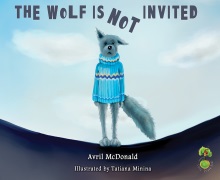
‘The Wolf is Not Invited’ A. McDonald. Crown House Publishing (2016). ISBN: 978-178583017-4 pp 32. Books in the Feel Brave Series for native children aged 4-7 deal with various problems children may encounter and help them deal with them. In ‘The Wolf is Not Invited’ the author addresses the issue of friendship and rejection. Wolfgang is left heartbroken when his best friend Catreen runs off without him to play with Clarissa. Spider shows Wolfgang how to make his own fun and Wolfgang realises that there are other great friends out there just waiting to be met! There are some situations and feelings that we cannot change and there are some that we can. Knowing the difference between the two (and some ways to make ourselves feel happy) is a great trick to have up our sleeves! I am sure ELT teachers will find ways of using the book in class. The appeal of the book also lies in the illustrations by T. Minina. The Wolf is Not Invited’ was announced winner of The People’s Book Prize Awards 2017 - children’s category
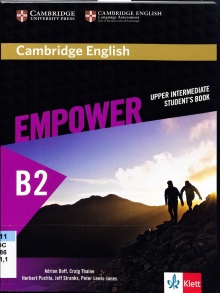
Cambridge English Empower. Upper Intermediate Student’s Book. B2. A. Doff, C. Thanine, H. Puchta, J. Stranks and P. Lewsi-Jones. Cambridge University Press (2015.) ISBN 978-1-107-46875-7, pp.176. This coursebook is part of a six level course (A1-C1) aimed at adult and young adult learners of English. In creating the course the authors cooperated with assessment experts from Cambridge University Press, and used the Cambridge English Corpus and Cambridge Learner Corpus to illustrate how English is really used and to help students avoid common mistakes. Each unit contains contextualised grammar and vocabulary input and practice, speaking integrated with pronunciation work, and addresses areas related to everyday English, receptive skills work (reading and listening), and writing tasks relevant to the learners’ needs. The course contains engaging classroom materials and topics, combined with additional online practice and regular assessment and feedback. It offers ample scope for personalisation and individual engagement. The book is illustrated with thought and discussion provoking photography and is accompanied by ample video materials.
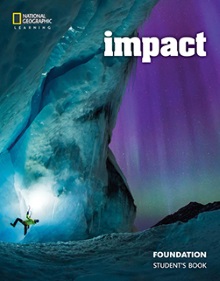
Impact. Foundation Student’s Book. K. Stannett (2017). ISBN 978-1-337-28031-0, pp 192. National Geographic Learning. This book is part of a four level course (A1-B2) aimed at teenage learners of English, either British or American English as the book is available in two versions. The topics include unusual families, alternative forms of education, humans and robots or space exploration, and have been chosen in such a way that they help the learners to better understand themselves, other people and the world that surrounds them. The units also have a strong cross-curricular content and 21st century skills focus, such as becoming a global citizen, preparation for future academic success and active roles in the learning process. The course encourages self-expression, introduces global issues and promotes active participation. The students not only learn English but also, through videos, meet people who are famous to National Geographic who could become their role models and whose ideas help the learners define or revisit their own. For example Max Lowe, an explorer, talks about family values, Chad Jenkins, a scientist and roboticist, talks about robots and how they will change people's lives, while Ross Davidson, a heritage conservationist, talks about the importance of preserving own culture. The section Make an Impact gives three different project ideas and encourages the learners to engage in a project of their choice. The book is illustrated with high quality National Geographic photographs.
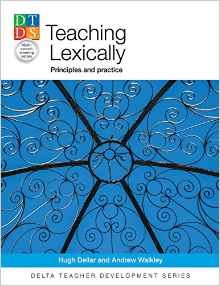
Teaching lexically. Principles and Practice. H. Dellar and A. Walkley. DELTA Publishing. (2016). ISBN 978-1-909783-22-5, pp162. This book has been published in the well-established DELTA Teacher Development Series. The aim of the book is to present the principle of the Lexical Approach, originating in early 90’s, and activities designed and developed by the authors which implement it. In Part A the authors present their route to the Lexical Approach and their understanding of the approach, the grammar based view of language, and compare it to the lexical view of it. Then they present the principles of teaching lexically and the problems that may result from it, including teaching vocabulary, grammar and the language skills. In Part B, which is divided into seven chapters, the authors present practical activities for teaching vocabulary, grammar, speaking, reading, listening, writing and revision in a lexical way. The activities are very practical and show the authors good understanding of the Lexical Approach as well as everyday classroom practice and reality. Part C looks at other areas like choosing, using and writing lexical materials, teaching at various levels, one-to-one, EAP or exam classes. For an interview with one of the authors go to: https://www.youtube.com/watch?v=1gWUkeWhxLs

Motivational Teaching. N. Thorner (2017) OUP. ISBN 978-0-19-420042-4, pp 100. This book is another title in the new OUP series: Into The Classroom, which is different from the old well established OUP series: Resource books for teachers. The books in this new series are short and practical guides aimed at teachers of primary and secondary school learners. The books help the teachers to explore new teaching tools and techniques, or to become familiar with new educational policies and ways of implementing them in the classroom. The title in question focuses on the various factors that motivate learners, among others through the use of innovative methods and techniques. Motivation has received a lot of attention in the recent years and has been the focus of many conferences and publications. Latest research offers new insights into what motivates learners, both as individuals and as a group. There are many tried and tested ideas and solutions, but new opportunities, materials and technologies offer even more options. Last not least motivation is very much in the learners as well as in the hands of the teacher or teachers who deliver a course. The book is divided into three parts: 1. the individual learner, 2. the learning context, and 3. issues in motivation. Some of the interesting areas touched upon by the book are: the pleasure of learning, motivation and the ideal future self, rewards and modelling, teacher behaviour and the learning environment, challenge and control, and gender and social roles. Like other books in the series, the title in question is a mix of accessible theory and practical ideas.
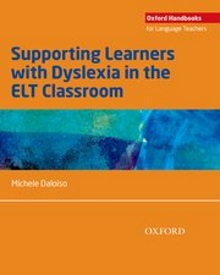
Supporting Learners with Dyslexia in the ELT Classroom. M. Daloiso (2017) Oxford University Press. ISBN 978-0-19-440332-0, pp 204. This book has appeared in the well-established series: Oxford Handbooks for Language Teachers, which is a more heavy weight series than the Into The Classroom series, coming from the same publisher. Other books recently published in the series include: How Languages are Learned by P. M. Lightbown and N. Spada, and Teaching Young Language Learners. Second Edition by A. Pinter. The subject of the book in question needs no special introduction as there is no teacher who has not encountered a dyslexic language learner, be it a child or a more mature learner. In the past dyslexia received relatively little attention in pre-service teacher training, so many teachers feel they have not been properly equipped to deal with it and the promotion of inclusive teaching embraces all sorts of learning differences. The book explores the nature and possible causes of dyslexia, linguistic as well as emotional and cognitive aspects of dyslexia, especially in the context of foreign or second language acquisition. The book offers methodological guidelines, strategies for phonological and orthographic work, for developing oral and written language skills, as well as testing and assessment of dyslexic learners in the classroom and more formal contexts.

Please check the Methodology & Language for Primary course at Pilgrims website.
Please check the Methodology & Language for Secondary course at Pilgrims website.
Please check the Creative Methodology for the Classroom course at Pilgrims website.
Please check the Special Needs & Inclusive Learning course at Pilgrims website.
Please check the How to be a Teacher Trainer course at Pilgrims website.


|